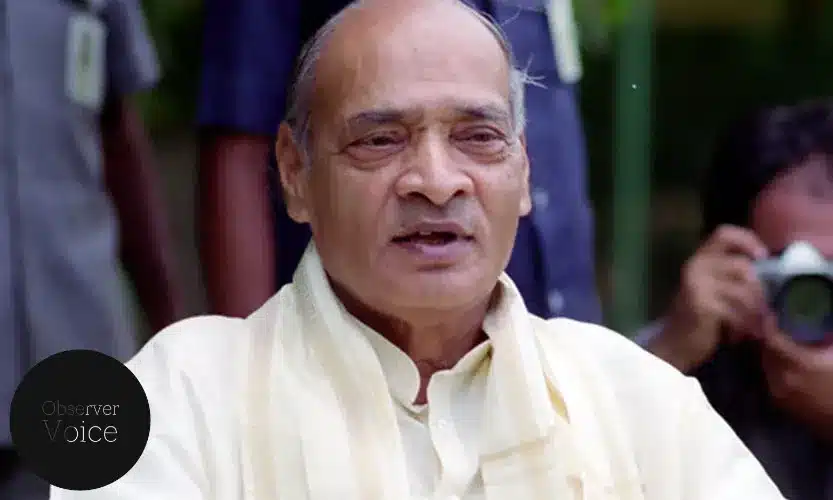The Life and Achievements of P. V. Narasimha Rao

P.V. Narasimha Rao (28 June 1921- 23 December 2004) was an Indian politician. From 1991 to 1996, he was India’s ninth prime minister.
Early Life And Education
Pamulaparthi Venkata Narasimha Rao, commonly known as P. V. Narasimha Rao, was born on June 28, 1921, in Laknepalli, Hyderabad State, British India, which is present-day Telangana, India. He hailed from a Niyogi Telugu Brahmin family and was adopted at the age of three by P. Ranga Rao and Rukminiamma, who were from agrarian backgrounds. Rao’s educational journey began in his home state, where he completed his schooling before enrolling at the Arts College of Osmania University. There, he earned his Bachelor’s degree. Furthering his education, he attended the University of Mumbai and Nagpur University, where he obtained his LL.M. His academic pursuits laid a strong foundation for his multifaceted career as a lawyer, politician, and writer, eventually leading him to become the 9th Prime Minister of India.
Career And Achievements
Pamulaparti Venkata Narasimha Rao political journey began in the Andhra Pradesh state legislative assembly, where he served from 1957 to 1977. He played a pivotal role in Indian politics, holding various ministerial positions, including the Chief Minister of Andhra Pradesh, Minister of Defence, Home Affairs, and External Affairs. Rao’s tenure as Prime Minister was marked by significant economic reforms that liberalized the Indian economy and ended the ‘license raj’. His decision to appoint Dr. Manmohan Singh as the Finance Minister was instrumental in steering India away from the brink of bankruptcy during the economic crisis of 1991. For his contributions, Rao was posthumously awarded the Bharat Ratna, India’s highest civilian honor, in 2024. A polyglot, Rao was fluent in several languages and had a keen interest in literature, translating works into Hindi, Marathi, and Telugu. His legacy as a scholar-intellectual is also notable, with his chairmanship of the Telugu Academy in Andhra Pradesh from 1968 to 1974. Rao’s impact on India’s economic and political landscape remains a significant part of his enduring legacy.
Notable Events And Milestones
P. V. Narasimha Rao early political career was rooted in the Indian National Congress, where he served in the Andhra Pradesh state legislative assembly from 1957 to 1977, and played a crucial role in supporting Indira Gandhi during the Congress split in 1969. As the Chief Minister of Andhra Pradesh from 1971, he implemented landmark land-reform policies and promoted political participation for lower castes. Rao’s tenure as the 9th Prime Minister of India from 1991 to 1996 was transformative. He steered India through the 1991 economic crisis by introducing liberal reforms that opened up the Indian economy to global markets. These reforms were pivotal in preventing the country from bankruptcy and set the stage for the rapid economic growth that followed. His decision to appoint Manmohan Singh as the Finance Minister was instrumental in this economic overhaul. Rao’s administration also established diplomatic relations with Israel, initiated India’s Look East policy, and rekindled India’s nuclear program, which had profound implications for India’s foreign policy and national security.
Moreover, Rao’s government defeated the 1994 United Nations resolution against India, effectively handled the insurgency in Punjab, and adopted a tough policy against terrorism in Kashmir. His tenure saw the opening of partial diplomatic relations with Taiwan, reflecting a strategic shift in India’s foreign relations. Posthumously, in 2024, Rao was conferred the Bharat Ratna, India’s highest civilian award, acknowledging his contributions to the nation.
Rao was not only a politician but also a scholar-intellectual fluent in several languages. He translated literary works and wrote fiction in Hindi, Marathi, and Telugu, contributing to the cultural tapestry of India. His leadership during a critical phase of India’s history, marked by economic liberalization and strengthening of national security, has left an indelible impact on the country’s trajectory towards becoming a global power. His legacy continues to influence contemporary Indian politics and economic policies, underscoring his lasting impact on history, society, and the world at large. He died on 23 December 2004, New Delhi, India.
Awards And Honors
- Bharat Ratna (2024): India’s highest civilian award, conferred posthumously.
- V. Narasimha Rao Memorial Award: Recognized for his spiritual and political contributions.
Additional Resources
- “Half-Lion: How P.V. Narasimha Rao Transformed India” is a book that utilizes Rao’s personal writings and records, offering an in-depth look at his life and the economic reforms he introduced.
- V. Narasimha Rao’s ancestral home in the village of Vangara, Telangana, is being developed into a museum, which will display his personal collection of books, his belongings, and photographs documenting his journey.
- The Ramananda Tirtha Memorial Trust in Hyderabad houses a collection of over 15,000 books, some of which belonged to P.V. Narasimha Rao and will be part of the museum’s collection.
Observer Voice is the one stop site for National, International news, Sports, Editor’s Choice, Art/culture contents, Quotes and much more. We also cover historical contents. Historical contents includes World History, Indian History, and what happened today. The website also covers Entertainment across the India and World.

